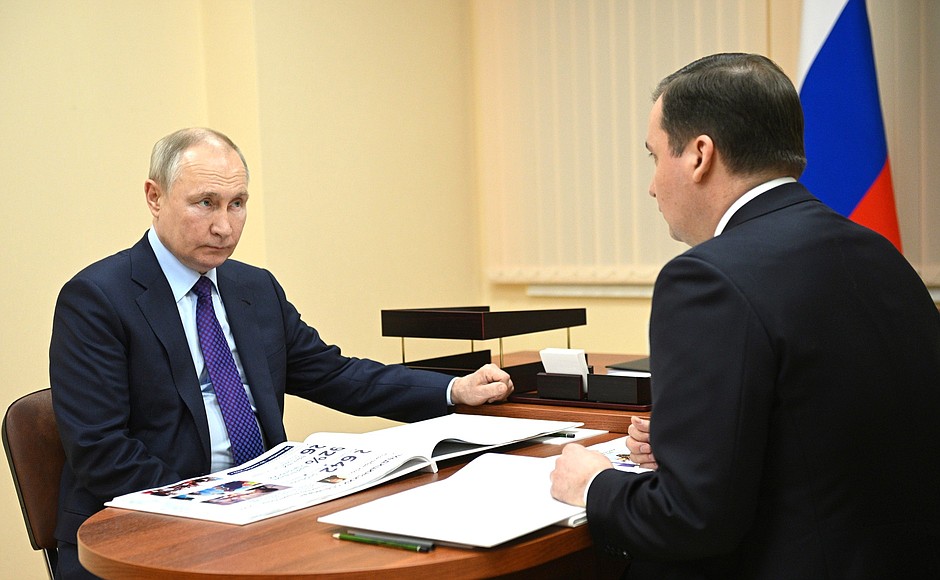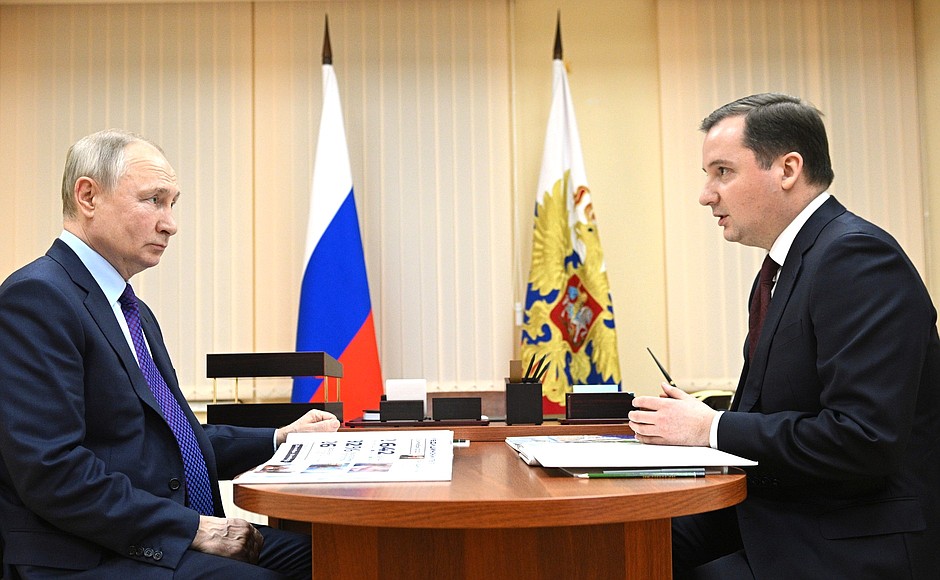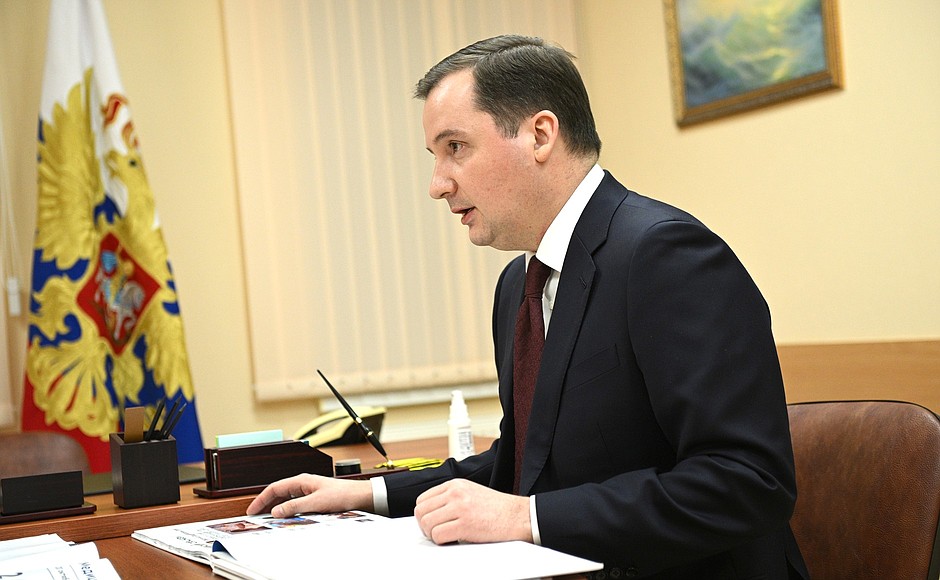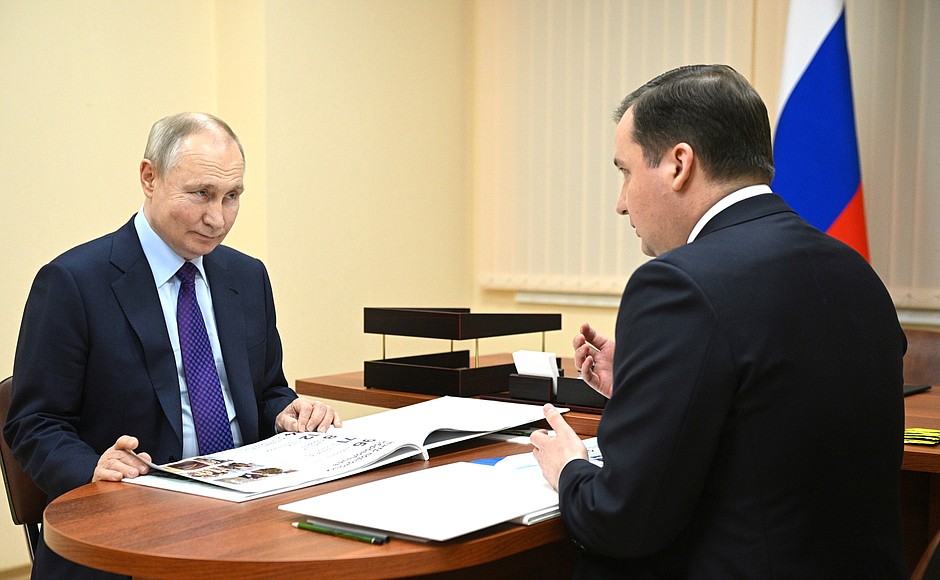The meeting took place after the meeting on developing the timber industry, and so began with a discussion of this topic. The Governor noted that the sector accounts for practically 40 percent of the region’s industrial base. In addition, the region has seen growth in shipbuilding and mineral extraction – the Arkhangelsk Region has 20 percent of Russia’s total diamonds.
Alexander Tsybulsky emphasised that the sanctions and restrictions have in fact opened up new opportunities and prospects for growth in all areas. He cited ship repairs as an example. Before it was done in foreign ports whereas now the Archangelsk shipyards are receiving applications for scheduled maintenance for late 2024–early 2025.
The Governor also described the support being provided to participants in the special military operation and members of their families, in part, the operation of the We Are Stronger Together centre, which can be contacted round the clock with any problem, from everyday issues with firewood delivery and road cleaning in rural areas to guidance on the application of laws.
The Governor reported that an Arkhangelsk battalion was formed in August on the basis of the 200thMotor Rifle Brigade of the Northern Fleet; it has a good reputation with the Fleet’s commanders. There is also a centre for training volunteers – 96 volunteers have already been trained and 71 have been deployed to the special military operation zone.
The region has helped the Donetsk and Lugansk people’s republics by dispatching a group of doctors of different specialties there. They examined 2,642 children in the DPR Novoazovsk District.
The Governor also told the President about efforts to revive the memory of an important page in history – the foreign military intervention in the North of Russia in 1918–1920. At that time, American, English and French interventionists occupied Arkhangelsk. They behaved as if it were their colony and seized the entire fishing and timber sectors, its entire economy. The Arkhangelsk Region is now developing two centres of historical and patriotic tourism. The first one is on Mudyug Island where the occupiers set up a concentration camp. People were kept there in inhuman conditions and hundreds of them died. The second centre is the Yuryev Frontier, where the 1,300 men of the Yuryev Regiment prevented the interventionists from moving deeper into Russia at the cost of their lives. Now, fortification structures are being restored there and a railway station has been built to accommodate excursion trains on weekends. Mr Tsybulsky also mentioned that chemical agents were used against Russians in this place at Winston Churchill’s initiative. Over 50,000 chemical shells were brought in.
According to the Governor, the region’s key socioeconomic indicators are growing and the budget went up by 17 percent despite all restrictions. The GRP is also on the rise, though foreign trade declined slightly in 2022. Sanctions were imposed on aquatic bio-resources – fish and crab – and timber exports. Unfortunately, the decline of the population due to migration continues although the rate is noticeably going down owing to improved social infrastructure. Now unemployment is at its lowest level, 1.3 percent. The region is building new schools and conducting major repairs in old ones.
The Governor told the President about road and housing construction and major repairs of the airport runway. Since 2021, the airport has surpassed the figure of 1 million passengers per year. The Governor spoke about modernisation of primary healthcare, in part, about five projects involving cancer treatment, assistance for children with diabetes, and the creation of the endoscopic centre and centralised clinical diagnostic laboratories, including a molecular genetic lab – the third largest in Russia. Another four projects are aimed at improving medical services in rural areas.
The Governor also told the President about the decision to build two floating docks. One dock on Sevmashpredpriyatiye is primarily designed for the purposes of the defence industry. The dock at Krasnaya Kuznitsa will be built to enhance capacity for civilian ship repair. For the first time in 30 years, Krasnaya Kuznitsa received contracts for four ice-class vessels, which will ensure year-round access to the islands. Defence industry companies are loaded with orders. Three major projects are being developed on the Arctic owing to special incentives for economic activity, including development of the Pavlovskoye lead-zinc deposit on Novaya Zemlya, the Diamond Technopark and the Northern Dvina iodine deposit. Work on the latter will start this year.
Mr Tsybulsky recalled that the Arkhangelsk Region is the birthplace of the great Russian scientist Mikhail Lomonosov and, as such, seeks to become an educational and research centre at least in the Russian Arctic. The region has already built infrastructure to support this project. In accordance with the Presidential instruction issued for the celebration of Lomonosov’s 300th birth anniversary, the region built a research centre for the comprehensive study of the Arctic. The region has two unique universities. The first one is Northern State Medical University, the only institution of this kind in the Russian Arctic. The other one is Northern (Arctic) Federal University that is a base for both education and research. In addition, the Russian Arctic, a world-class educational centre, was established at the university. It unites three regions – the Murmansk Region, the Nenets Autonomous Area, and the Arkhangelsk Region. Its main fields of study are biotechnology, ecology, shipbuilding, ship repair, diamond synthesis and health protection. Furthermore, late last year the Digital Arctic IT park was opened. It has started working with industrial partners on navigation-free sailing, smart city programmes, smart forest management, and telemedicine that is very important for the North. The region had the winning bid to build world-class student campuses. The Arctic Star campus, a public-private partnership on concessional terms, is supposed to be implemented by 2027.
The Governor touched upon efforts to combat forest fires. This year, 181 fires devastated 3,000 hectares, although this is not a large area compared to the region’s vast forests. In all, 91 percent of forest fires were extinguished in the first 24 hours. This became possible by deploying many more aerial patrols, including those on additional routes, and by completely renewing the equipment used by the forest fires centre. The number of smoke jumpers has increased. Today, there are 150 smoke jumpers helping put out forest fires, and 45% of them work in neighbouring regions virtually all the time. A very good school has evolved in the region over many years, and it was decided to establish the Arctic smoke jumpers training centre.
The Governor reported on the fulfilment of two Presidential instructions to restore unique landmarks and to ensure their normal state. They include Kenozero National Park, which has amazing natural landscapes and historical sites, primarily wooden architectural structures and landmarks. Two other church complexes, specifically, the Pochozersky Church Complex and the Porzhensky Churchyard, have become major attractions of the Arkhangelsk Region. Every year, Kenozero National Park welcomes more and more visitors.
In this connection, Alexander Tsybulsky asked the President for his support. Kenozero National Park has a unique collection of wooden “sky” – wooden icons or religious paintings, the largest such collection in Russia. Unfortunately, there are no facilities where they can be displayed. Work is now underway to estimate the cost involved. However, it is so far impossible to include them in the targeted federal investment programme. If there is a presidential instruction on this matter, the regional authorities will be able to start implementing this project in 2024. This would be an excellent opportunity for the visitors who come to Kenozero National Park.
Vladimir Putin agreed that, indeed, this would be an excellent point of attraction.
Alexander Tsybulsky also asked the President to help build a swimming pool in Severodvinsk, a shipbuilding centre. Vladimir Putin promised to help resolve this issue.




